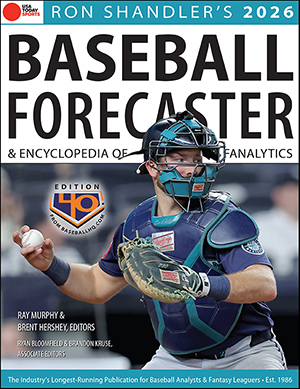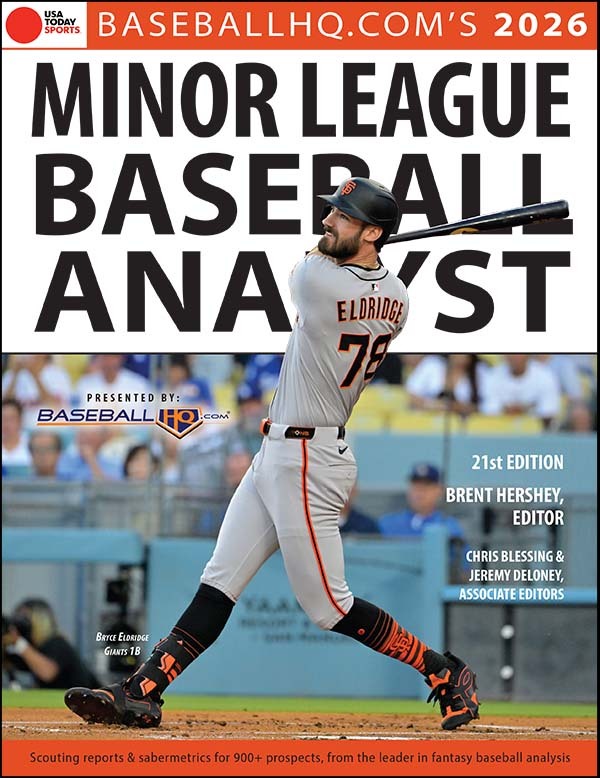
(*) MASTER NOTES: The Giles files
On Monday, HOU manager A.J. Hinch announced that Luke Gregerson will remain as the team’s closer, and that Ken Giles will pitch in a “dynamic” role. Ordinarily, this wouldn’t be a big deal. “Closer keeps his job” is normally on a par with such news as “Kardashian sister seen at Hollywood party.” Managers choose closers every season. And, in the case of many teams, several times every season.
Nonetheless, Hinch’s announcement inspired the baseball media and fantasy analysts to wonder if this might be the “shot heard ’round the world,” presaging a long-awaited shift in relief pitcher usage. But while it is exciting to think about what Hinch’s announcement could mean, it seems much more likely that it won’t mean much in baseball or, by extension, in fantasy baseball.
When the Astros acquired Giles from the Phillies in the offseason, it seemed certain he would be the big horse in the bullpen. They had given up a heavy package that included top draft pick Mark Appel and current tout favorite Vincent Velasquez. Giles had done well as a closer in 2015 after taking over for established closer Jonathan Papelbon, and certainly looked more dominant in relief than Gregerson. He had a sensational 1.18 ERA/0.79 WHIP to Gregerson’s 3.10/0.95. He had an 11.2 K/9 Dom rate to Gregerson’s 8.7. His 221 ERA+ (a park-adjusted measure of his ERA indexed to all of MLB) was almost 100 points better than Gregerson’s, and fifth-best among all MLB relievers. Given all that, it looked like a foregone conclusion that Giles would replace Gregerson as HOU closer.
Instead, the Astros kept Gregerson as their ninth-inning specialist. But Hinch accompanied his announcement with comments that suggested a bigger, more significant development. In particular, a Jake Kaplan article in the Houston Chronicle (repeated in the San Antonio Express News), quoted Hinch as saying some things that might set analytics guys’ hearts aflutter. “I'm going to have Giles pitch in a couple of different roles,” Hinch said, “depending on what the highest-leverage situation of the game would be" (emphasis added). He also said, “To win at this level and go deep into the playoffs, you're going to need guys to be dynamic, and we acquired one of the most dynamic relievers available last winter. And I'm going to use him.”
Those terms “dynamic” and “highest-leverage” fairly jumped off the page. For years, fantasy touts and sabermetric analysts have been arguing that bullpens should be dynamic, with flexible pitchers’ roles focused on getting the best available reliever into the game in the highest-leverage situation.
Hinch seemed to be accepting those ideas and applying them. His comments were interpreted as, “We’re going to use our best reliever (Giles) flexibly, when he can get us out of the toughest game situations.” The news naturally got some wondering if this was going to be the next big win for statheads over traditionalists. Bullpen tactics are among the many potential changes from “big data” and analytics, after such game-altering advances as Moneyball-style market evaluation; defensive metrics and shifting; and debunking Goose Gossage when he says something ridiculous, such as every time he talks about baseball lately.
Unlock all of our insights on your way to a fantasy title! See what our season-long coverage offers and then subscribe to BaseballHQ.com.
Fantasy Implications
If the Astros were changing reliever use patterns to focus more on game-situational leverage, and succeeded with it, other teams would follow suit (except for Arizona, where men are men and numbers are for sissies). The change would surely affect fantasy play. Not right away, but the value of saves would change dramatically. First, the saves would be more dispersed, because the top guns would be throwing more seventh innings and fewer ninth innings, and lesser relievers would be vulturing the easy mop-up saves. (Of Gregerson's 31 saves last year, 11 were duck-soupers, protecting three-run leads; only nine were of the one-run variety.) In turn, high saves total would correlate less well with the exceptional ERAs, WHIPs and strikeouts that add value to our top closers. Indeed, relatively large saves numbers might accrue to pitchers who might otherwise not even be roster-worthy for fantasy purposes.
The net result would be that saves would be devalued, becoming more proportionately valued than they are now. Probably a good thing. The effect would be a significant revaluation of all relievers, and we would expect to see more leagues consider adding holds to fantasy scoring. (I'd like to see a new category, the "Rescue," for pitchers who enter games in very critical high-leverage situations and get through unscathed, giving up no baserunners via hit, walk or HBP. Call it the “Rescue” and maybe get an antacid company to give out an award for it.)
But…
Perhaps unfortunately, then, the Astros’ decision is not likely to be the harbinger of a major change in bullpen tactics, for a couple of reasons.
First, the team’s commitment to the dynamic bullpen is not as profound as some interpretations of Hinch’s comments about dynamic bullpens and high leverage indicate. He also made comments that would have been perfectly normal coming from, well, Goose Gossage. Hinch said about Gregerson, “He's got a slow heartbeat. He's got a real feel for how to pitch…. His calmness in the intense moments are (sic) critical in giving the guy the ball the last part of the game.” We would not expect a manager on the leading edge of metrics-based game tactics to fall back on notions like “heart,” “feel” and “calmness.” But he did.
Second, Hinch also mentioned the importance of pitchers knowing their places in the bullpen hierarchy so they have an idea when to start loosening up and getting physically ready to go into games. One report quoted Hinch as saying, "(F)or the purposes of getting guys prepared, it's important they know generally how they're going to be used.”
This is something that analytics guys have pooh-poohed over the years. Pitching is pitching, right? Get in there when they tell you! But it has some merit relating to the issue of warming up. But longtime closer Huston Street said recently that the uncertainty of whether a high-leverage situation is brewing could mean more warmups without actal pitching. He estimates he already warms up 35-40 times every season when he ends up not being need, on top of all the warmup and in-game effort when he does pitch 60 or so times per year. And all that warming up, plus pitching in the games, is hard on the arm. Because high-leverage situations can arise (and subside) the top "dynamic" relievers could add dozens more warmups in a season, potentially leading to greater risk of arm fatigue and injury.
As well, there is the issue of knowing when the highest-leverage situation is actually occurring. The Tom Tango Leverage Index (LI) charts show that leverage is intrinsically higher in the late innings. A reliever coming into a game coming in the ninth with the bases empty to protect a one-run leadhas a higher leverage than a pitcher coming in with the same lead, nobody out—and runners at the corners! It might just be that by holding their best guy to the end, managers, perhaps unwittingly, have been using their best pitchers in the highest-leverage game situations all along.
Finally, there’s the money. If two relievers have essentially identical stast, the one with 30+ saves will command double the salary of the one without saves. As a veteran, Gregerson is already cashing the big checks. But Giles is just coming towards arbitration, and if the Astros can keep his saves totals down, they can expect suppress his salary iin arbitration, perhaps for years. It probably helped, PR-wise, that he had a a terrible spring, but it could well be that the plan all along was to emulate the Royals' strong bullpen with Giles reprising the Wade Davis/Kelvi Herrera role and Gregerson starring as Greg Holland, all while saving millions. Because he is cost-controlled for years, and that cost can be manipulated, he will be just as valuable in high-leverage situations as he would be as a closer.
Conclusion
It’s fun to think that some kind of sea change could happen that significantly alters the chemistry of the game and, as a result, of the fantasy games stemming from it. Some of these are happening or have happened, like the growing number of strikeouts, the focus on power, changes in roster makeup, and more.
But the role of closers seems unlikely to change a lot in the near future, if ever. So saves will remain overvalued, and if leagues want to change that, they’ll just have to go ahead and change their rules directly.





-300x200.png)



